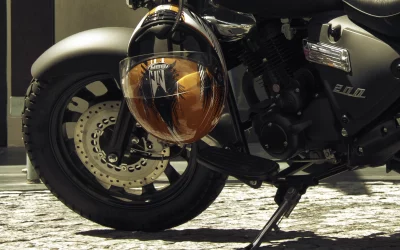Important Laws for Motorcyclists to Be Aware Of
When a biker is hurt in a Colorado motorcycle accident, it’s important to understand the basic regulations that govern motorcycle ownership, riding, licensing, and insurance. Even better, before purchasing or riding a motorcycle, the rider should have a basic understanding of Colorado law.
In any case, following a Colorado motorcycle accident, the biker, passenger, and family of the injured victims should seek legal counsel, consultation, and representation from a personal injury attorney. Colorado’s motorcycle rules are, in some ways, unique to the state. Other states may have laws that are similar to Colorado’s, but they are not the same.
Free Consultation
In Person | Phone | Zoom
Motorcycle License in Colorado
A biker must be properly licensed to ride a motorcycle in the state of Colorado. The rider must complete a motorcycle safety course that complies with the Colorado Motorcycle Safety Education Program to earn a motorcycle license. The authorized course must last at least 12 hours and contain 6 hours of hands-on motorcycle training.
Motorcycle Registration and Insurance in Colorado
Motorcycle insurance is not needed to register a motorcycle in the state of Colorado. As a result, a rider in Colorado may drive a motorcycle without any insurance at all under some conditions. There are hazards associated when a biker is operating a motorcycle without insurance.
Unless and until specified motorcycle coverage is bought, if the motorcyclist collects certain traffic fines and/or is involved in an accident that is the motorcyclist’s responsibility, the motorcyclist’s license will be revoked.
Requirements and Restrictions for Motorcycle Helmets in Colorado Helmets are required for all motorcycle riders under the age of 21.
To comply with the law, a rider who is 21 years of age or older decides not to wear a DOT- approved helmet must show that they have at least $10,000 in medical insurance that might pay for their injuries. Colorado has its own rules regarding motorcycle ownership and insurance.
In Colorado, an injured motorcycle or rider is not obliged to have Personal Accident Protection (PIP) insurance, unlike injury victims in passenger cars. As a result, medical payments may be recovered from the at-fault driver’s insurance company since the motorcyclist does not have PIP coverage.
Medical costs are usually reimbursed or compensated after the whole case has been resolved. Furthermore, unlike a car driver or passenger, a motorcyclist does not need to establish that he or she had a permanent injury to claim damages for pain, suffering, loss of enjoyment of life, and mental anguish.
Motorcycle Operation in Colorado
Motorcycles and mopeds are governed by Section 316.208 (1), which states that “Any person operating a motorcycle or moped shall be granted all of the rights and shall be subject to all of the duties applicable to the driver of any other car under this chapter, except as to special regulations in this chapter and except as to those provisions of this chapter which by their nature can have no application.”
This book will go through these and other subjects in more depth. Knowing the law is one thing; pursuing a lawsuit or claim on behalf of a motorcyclist who has been hurt is quite another. When a motorcyclist is hurt due to another driver’s carelessness, the injured motorcyclist should contact a Colorado Motorcycle Accident Attorney for assistance.
Motorcyclist Rights – Traffic-Laned Roadways
The rights of motorcyclists in Colorado are established under Section 316.209, Colorado Statutes – Operating Motorcycles on Roadways Laned for Traffic. It stipulates the following:
Riding motorcycles on traffic-laned highways.
All motorcyclists have the right to the full use of a lane, and no motor car must be operated in such a way as to deny a motorcycle such right. This clause does not apply to motorcycles travelling in a single lane two abreast.
A motorcycle operator must not overtake and pass in the same lane as the car being overtaken.
A motorcycle may not be operated between lanes of traffic, adjacent lines, or rows of cars.
In a single lane, no more than two motorcycles may be operated side by side.
In the course of their official responsibilities, police officers and firemen are exempt from subsections (2) and (3).
A violation of this section is a noncriminal traffic infraction that is penalized under Chapter 318 as a moving violation.
The Colorado Legislature properly acknowledged motorcyclists’ right to utilize a lane in the same way that cars and trucks do. Furthermore, other drivers are prohibited from denying the biker access to Colorado’s roadways, highways, and streets under the legislation above. Some individuals object to motorcycles being allowed on the roads.
Some people are apprehensive about riding a motorcycle near other cars. Other drivers’ concerns about motorcyclists are not taken into account by the legislation. Motorcyclists’ rights, freedoms, and liberties are recognized by Colorado law; nevertheless, their rights are also controlled by reasonableness, responsibility, and safety.
As previously stated, Colorado has enacted comparative fault legislation. As a result, a motorcycle accident’s responsibility or guilt might be divided among two or more persons. Consider the case of a motorcycle rider rushing through an intersection. Another motorist approaching from the other direction makes a careless left hand turn into the motorcyclist’s right of way, resulting in a collision.
There may be a blame allocation between the rider and the driver based on these circumstances. If the matter proceeds to a jury trial, the jury may assign blame to each individual. A jury may find the motorist to be 75 per cent at fault and the biker to be 25 per cent at fault. In this case, the jury would still give the motorcyclist the entire amount of damages.
Still, the judge would decrease the judgement by the percentage of comparative guilt at the end of the trial. For example, if the jury awarded $100,000, the judgement would be lowered by 25%, which indicates the motorcyclist’s comparative culpability. As a result, the rider would be awarded $75,000 based on these simple facts.
It’s also worth mentioning that each case or claim should be judged on its facts and merits. Each case or claim, like persons, is unique and should be addressed as such.
$10,000 in medical coverage for injuries sustained due to a motorcycle accident while operating or riding.
The legal criteria for wearing a motorcycle helmet have evolved throughout time. Currently, a motorcycle rider over 21 and is protected by insurance coverage that pays at least $10,000 in medical benefits if injured in a motorcycle accident is excused from wearing a helmet for the legislation mentioned above. If certain conditions are satisfied, the use of a motorcycle helmet is no longer required by law. In a personal injury lawsuit, however, it may be argued that a biker who fails to wear a helmet is negligent or irresponsible for not doing so.
The legislation above makes no provision for a defendant, corporation, or insurance company to argue that failing to wear a helmet establishes carelessness. As a result, it seems that the motorcycle helmet defense in Colorado is still possible; nevertheless, the parts of the defense must be demonstrated.
However, there must be a link between the failure to wear a helmet and the harm sustained in the crash. Rex Utilities v. Gaddy, 413 So. 2d 1232 (Fla. 3rd DCA 1982) was a case that read and applied the text of Colorado Statutes Section 316.211 before there was a “medical benefits” exception to the helmet requirement.
Nonetheless, it seems that this decision is still excellent law in terms of how the motorcycle defense must be proved to be used as a possible defense in a civil lawsuit involving a motorcyclist’s injuries. In this instance, the Court found that the defendant’s refusal to wear a motorcycle helmet was irrelevant and inadmissible since the defense failed to show that wearing a helmet was the primary cause of the motorcyclist’s injuries.
Here’s an example that will help you understand the Court’s decision. Let’s imagine a motorcycle, John Smith, gets rear-ended at a red signal by another car. John Smith has the required $10,000 in “medical benefits” coverage but chose not to wear a motorcycle helmet as a result. John Smith received a fractured leg and no additional injuries as a consequence of the collision.
John Smith did not suffer, and he did not claim to have had a concussion. The fact that John Smith was not wearing a helmet in this scenario is completely immaterial to the situation. As a result, any reference of John Smith’s failure to wear a helmet is likely to be excluded by a court.
The analysis would be different if John Smith suffered a head injury that might have been avoided or greatly reduced by wearing a helmet. Expert evidence would be required in this case to link the motorcyclist’s injuries to his failure to wear a helmet.
As you can see, the needs and protections connected with wearing a helmet are complex and difficult to understand. As a result, obtaining legal counsel, assistance, and representation from a Colorado Motorcycle Accident Attorney is beneficial. While a motorcyclist has the right to choose whether or not to wear a helmet, this choice may influence the value of the biker’s injury claim.
Risks to Motorcyclists and Others from Texting While Driving
Every driving community has a well-known and verified threat. “Texting While Driving” has the potential to cause major motorcycle accidents and injuries. At the same time, the phones themselves are “smart,” using cellphones like iPhones, Android phones, and other gadgets while driving is not. In reality, texting, reading, scanning, or otherwise using a cell phone while driving is very risky—the act of texting while driving is prohibited in most states, including Colorado.
It is important to realize that these regulations apply to more than simply texting while driving. Let’s imagine you’re looking at a mobile phone or tablet and come across an intriguing news story.
If the motorist then takes the time to “read” the item, the appropriate Colorado Statute may be violated. Furthermore, and maybe more crucially, just reading a news item on a mobile device might cause a major motorcycle accident, resulting in permanent damage or even the wrongful death of the biker.
It is critical for all drivers to be aware of their surroundings, traffic, weather, and, yes, the presence of law-abiding motorcyclists on the road, as underlined by the popular campaign “Look Twice for Motorcycles.” Distracted driving, such as texting or reading on a mobile device, puts a biker who is otherwise following the laws of the road and observing traffic regulations at undue risk.
Because of their smaller stature and fragility, motorcyclists are especially vulnerable to distracted driving by other cars. Let’s face it: a motorcycle is no match for a standard passenger car in terms of physical strength. When a business car is involved, the issue becomes considerably more complicated.
As stated in this act, a violation of the Colorado Ban on Texting While Driving Law may come from typing, transmitting, or reading data from a mobile device. Distracted drivers, especially those who use mobile devices for phone conversations, texting, social networking, and other activities, may overlook up to 50% of what is around them, including pedestrians, traffic control devices, other motor cars, and, yes, motorcyclists, according to the National Safety Council.
If a motorcyclist is hurt by a distracted driver who is texting or otherwise illegally or negligently using or viewing a mobile device while driving, a claim or action against the reckless driver of the car may and should be pursued.
While distracted driving and other negligent conduct are reprehensible and may assist in establishing the driver’s responsibility, they are just one piece of the bigger jigsaw that makes up an injury case or claim. It should be remembered that just proving that a motorist was texting while driving does not guarantee that a personal injury lawsuit will be successful.
Following a motorcycle accident, the biker and his or her family confront several concerns and obstacles. At these trying times, you should seek the counsel, direction, and legal representation of a Colorado Motorcycle Accident Attorney.







